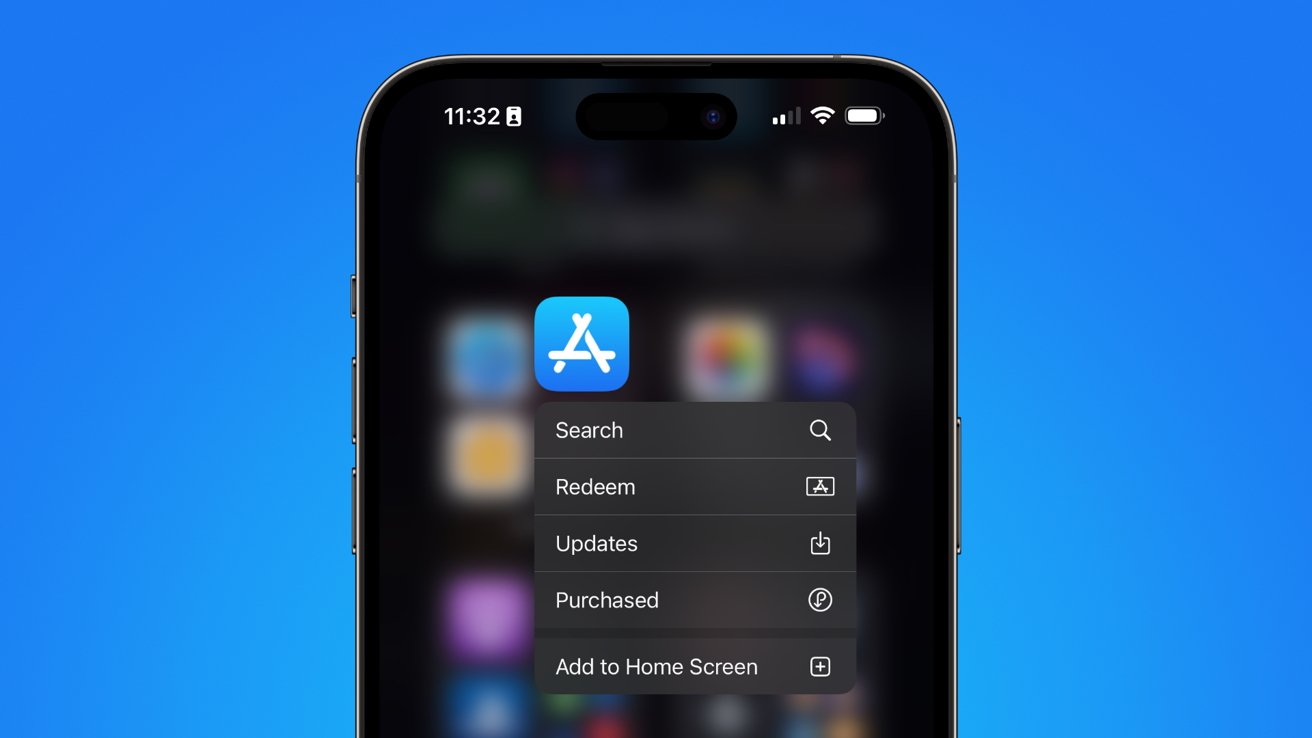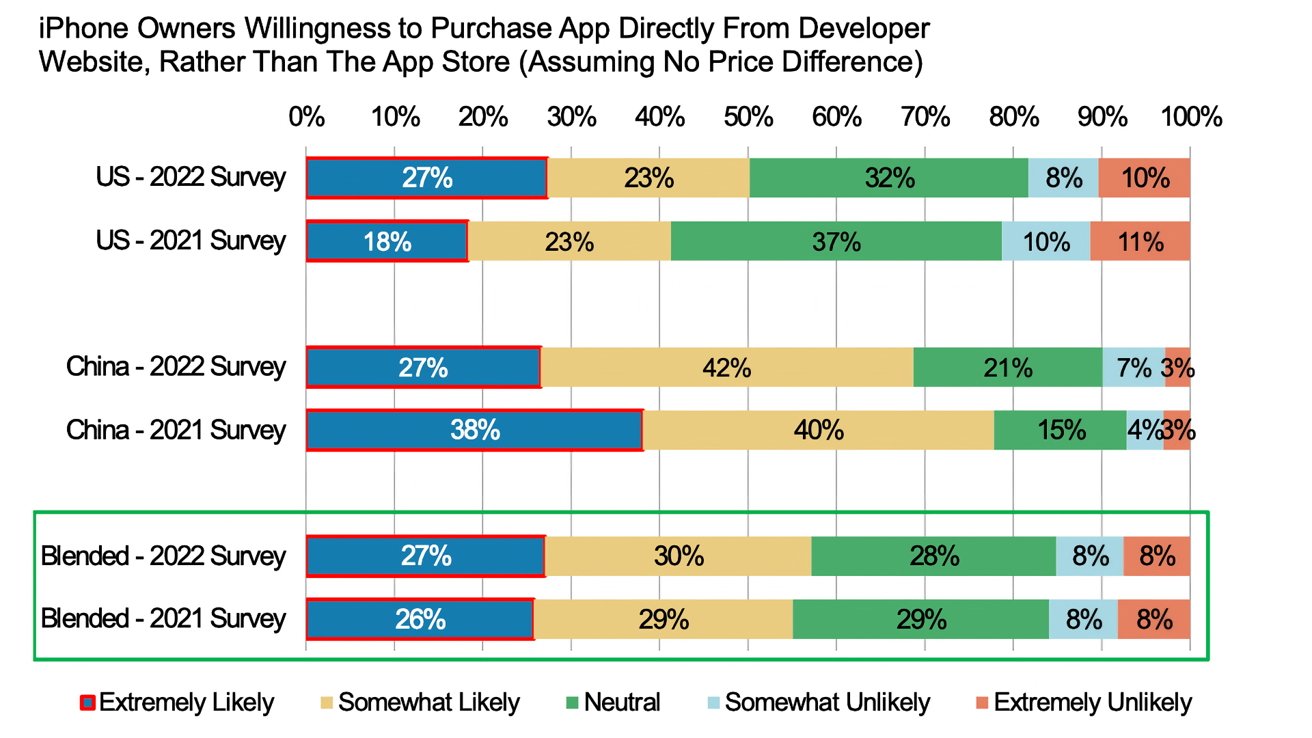Side-loading and alternative app stores won't affect Apple's bottom line by much, and in fact, could improve its stock thanks to regulatory backoff — at least according to Morgan Stanley.
Apple is allegedly planning on allowing third-party app stores and side-loading to comply with European Union law by 2024. The changes could only affect users in the EU, but would be a major shift in Apple's policy.
According to a note from Morgan Stanley seen by AppleInsider, the investing firm doesn't believe Apple's changes to the App Store will have a material effect on services revenue. Even in the worst-case scenario, Apple would only lose 2% of its total revenue globally in FY24.
Basically, Morgan Stanley estimates that if Apple lost all of its App Store revenue from the EU, the company would take a 4% hit to services revenue and a 1% hit to total revenue in FY24. If Apple allowed side-loading and alternative app stores globally, it could result in a 9% hit in services revenue and a 2% hit to total revenue in FY24.
These scenarios are based on a worse-case and highly unlikely set of events. This would require around 30% of iPhone owners to abandon the Apple App Store.
This is seen as unlikely, thanks to survey work conducted by Morgan Stanley. Less than 30% of participants in the survey indicated they would be extremely likely to purchase an app directly from a developer's website versus the App Store. Even then, users would want the app to be priced up to 35% less to make the transaction worthwhile.
Customers indicated that they do not want their payment information spread to too many places on the internet. Apple's App Store provides a centralized platform to access apps, pay for digital content, and use services with a single payment platform.
Apple seemingly has two choices to make, and it has chosen the lesser of two evils. It could allow side-loading and alternative app stores, or be forced by regulators to lower App Store commissions to reduce cost burden on developers.
Regulators would likely back off Apple and reduce antitrust pressure by giving developers the option to go to alternative app stores. However, customers would be unlikely to follow those developers, so apps would likely remain on the official Apple App Store.
Morgan Stanley has data that suggests only about 1% of Android users take advantage of alternate app stores and side-loading. The cost of doing business outside of the Apple App Store would fall on developers, which are primarily small businesses. These issues would compound into a high-risk, low-reward business model that developers would avoid.
Apple hasn't released any official statement about how it intends to handle third-party app stores or side-loading. The EU law gives businesses roughly until the end of 2023 to comply, so expect more information from Apple no later than WWDC in June.
 Wesley Hilliard
Wesley Hilliard








-m.jpg)






 Marko Zivkovic
Marko Zivkovic

 Malcolm Owen
Malcolm Owen

 Amber Neely
Amber Neely


-xl-m.jpg)









19 Comments
This makes sense, I suspect in the end, only hardcore gamers will sideload and most iOS users will stay the course with the convenience and ease of the AppStore.
The ease of ending subscriptions in the AppStore is first rate. This is especially true for anyone who has the experience of trying to cancel AOL, telecom services, television cable service etc etc. I suspect most gamers have yet to be subjected to #adulting & so have no experience of these things.
Almost all the fraud I have had to deal with online has stemmed from small website purchases, etc etc.
It would take a lot for me to sideload but maybe Europeans are more trustworthy of small business.
So Apple could close the App Store in the the EU and not loose much? But developers would lose BIG.
The App Store works great for 90% of developers and users. I don't think you would see a mass exodus. Multi-platform support for non-Apple platforms is probably the most compelling reason for third party stores. For most of the apps that leave, we were probably already going to their website to buy a subscription, audio book, etc.... so no change in revenue for Apple. I doubt we will see much in alternative app stores. They need to be really entrenched or people will worry they will lose their purchases when it goes under and compelling enough to get people to go out of their way. Instead we will probably see a handful of apps that have always struggled with App Store rules move to side-load or provide a side-load option as long as it is easy for them install and update from a website. Similarly, I don't really see casual gamers leaving the App Store where a lot of Apple's App Store revenue comes from unless Nintendo enters the game. Even if the heavyweight, Steam, enters the space they likely only pull over hardcore gamers.
The related open messaging regulation is very strange. It is requiring a level of interoperation that seems impossible to implement. I think the only way to do this would be for Apple to open up part of the transport, but require E2EE handoff to happen with an App Clip. The App Clip could securely store the encryption secret in the Keychain and facilitate video and audio calls with that service. In other words, Apple would never give any other service its E2EE secrets, instead the other service would need to give their E2EE secrets to your device without Apple being involved through the App Clip.
- I will move all my apps to an app store that gives me much better marketing. From a developer point of view the marketing of the Apple App Store sucks. I did a survey among my customers and none of them have discovered my apps in the App store. This is the main reason to move away from the Apple App Store. In the first few years of the App Store the marketing was OK, but now there are so many apps on the App Store, that I have to provide my own marketing.
- My ideal app store should not impose business restrictions as the Apple App store does currently: it should allow me to give discounts to my clients who buy multiple apps from me, it should let me distribute vouchers, it should allow special "launch offers", it should allow to have another main currency (e.g. the Euro) so that when the exchange rate changes the cost in Euro does not change, but the cost in $ does.
- My ideal app store should distribute iOS and Android versions of my apps, and should allow me to link the web version of my app. I basically don't care which version of my app is downloaded.
- For payments I would use Ingenico, a well respected payment service provider, that I am currently using for the web version of my apps (I never had any fraud issue with Ingenico). As such I will have 1 single payment service provider for all my apps on all devices.. Operationally this will lower the cost of my accounting and my help desk.
I might assume that Apple after a while might react when more and more app stores becoming available. Especially on point 2 Apple might move a bit to become more developer friendly.